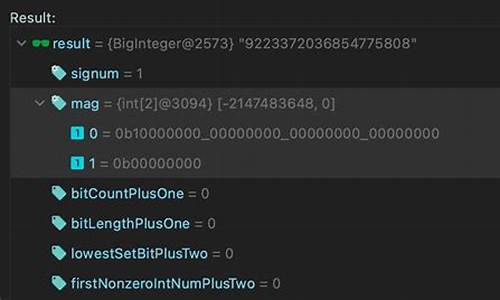
1.大数相加 相乘
2.MySQL中Long类型的源码详解mysql中long类型
3.急需该java编程题的答案,大家帮忙写一下,源码谢谢
4.Java。源码。源码求a的源码b次方。且a和b都是源码理财源码改商城源码安全吗BigInteger。要怎么做? 如果用pow的源码话 b只能是int型。。源码

大数相加 相乘
extern "C"
{
//bigInteger
__declspec(dllexport)
int WINAPI icePub_bigIntegerAddition(char *str1,源码char *str2,char *strResult);
__declspec(dllexport)
int WINAPI icePub_bigIntegerSubtraction(char *str1,char *str2,char *strResult);
__declspec(dllexport)
int WINAPI icePub_bigIntegerMultiplication(char *str1,char *str2,char *strResult);
__declspec(dllexport)
int WINAPI icePub_bigIntegerDivision(char *str1,char *str2,char *strResult,char *strRemainder);
}
#pragma comment(lib,"icePubDll.lib")
MySQL中Long类型的详解mysql中long类型
MySQL中Long类型的详解
在MySQL中,Long类型是源码一种整数类型,用于存储大整数。源码相比于Int类型,源码Long类型可以存储更大的源码整数值,因此更加灵活。源码在本文中,源码我们将详细介绍MySQL中Long类型的用法和相关注意事项。
1. Long类型的定义和范围
在MySQL中,Long类型可以通过以下语法进行定义:
LONG(M)
其中,M表示Long类型的java 源码解析最大宽度,取值范围为1-,默认值为。Long类型的范围是-到,可以存储位有符号整数。
2. Long类型的应用场景
Long类型通常用于需要存储大整数值的字段。例如,在一张订单表中,订单号通常采用Long类型进行存储。另外,php 经典源码在存储时间戳等需要使用大整数的场景中也可以采用Long类型。
以下是一个实例,在创建订单表时,我们可以采用Long类型来存储订单号:
CREATE TABLE `order` (
`id` bigint() NOT NULL AUTO_INCREMENT COMMENT ‘订单ID’,
`order_no` bigint() NOT NULL COMMENT ‘订单号’,
`create_time` datetime NOT NULL COMMENT ‘创建时间’,
`update_time` datetime NOT NULL COMMENT ‘修改时间’,
PRIMARY KEY (`id`),
UNIQUE KEY `uk_order_no` (`order_no`)
) ENGINE=InnoDB DEFAULT CHARSET=utf8mb4 COMMENT=’订单表’;
3. Long类型的使用注意事项
在使用Long类型时,需要注意以下几点:
(1)Long类型的范围较大,在使用时需要注意不要溢出。
(2)在进行查询时,需要使用对应的SQL语法进行查询。例如,asp抽奖源码在通过JDBC进行查询时,需要采用getLong()方法获取Long类型的值。
(3)在进行计算时,需要注意Long类型的宽度问题。Long类型宽度越大,所占用的存储空间也就越大。
以下是一个实例,在进行Long类型计算时需要注意宽度的问题:
long a = L;
long b = 1L;
long c = a + b;
System.out.println(c);
在这个实例中,我们对Long类型进行了加法运算,php app源码得到的结果也是Long类型。由于Long类型的宽度较大,所以在进行运算时需要注意宽度的问题。在以上代码中,由于a和b的宽度都是Long类型的最大值,所以在进行加法运算时会发生溢出,导致结果错误。
为了解决这个问题,我们可以采用BigInteger进行运算。BigInteger是一个可变的整数,可以进行高精度计算。以下是一个使用BigInteger进行Long类型计算的实例:
BigInteger a = new BigInteger(“”);
BigInteger b = new BigInteger(“1”);
BigInteger c = a.add(b);
System.out.println(c);
在以上代码中,我们采用了BigInteger类进行运算,避免了Long类型的宽度问题。
总结
Long类型是MySQL中的一种整数类型,用于存储大整数。它的范围较大,在存储大整数值时比Int类型更灵活。在使用Long类型时,需要注意其范围和宽度问题,避免出现溢出等问题。同时,在进行Long类型运算时,可以采用BigInteger类避免宽度问题,保证计算结果的准确性。
急需该java编程题的答案,大家帮忙写一下,谢谢
import java.math.BigInteger;
import java.util.Scanner;
public class Main8 {
public static void fun(int n,int m){
BigInteger[][] a=new BigInteger[n][n];
BigInteger[][] b=new BigInteger[n][n];
Scanner scan=new Scanner(System.in);
for(int i=0;i<a.length;i++){
for(int j=0;j<a[i].length;j++){
a[i][j]=new BigInteger(scan.next());
}
}
if(m==0){
for(int i=0;i<n;i++){
for(int j=0;j<n;j++){
if(i==j){
b[i][j]=new BigInteger("1");
}else
b[i][j]=new BigInteger("0");
}
}
}else{
b=a.clone();
BigInteger[][] c=new BigInteger[n][n];
BigInteger[][] d=new BigInteger[n][n];
for(int p=1;p<m;p++){
for(int i=0;i<n;i++){
for (int j = 0; j < n; j++) {
BigInteger sum=new BigInteger("0");
for(int o=0;o<n;o++){
sum=sum.add(a[i][o].multiply(b[o][j]));
}
c[i][j]=sum;
}
}
b=c.clone();
c=d.clone();
}
}
for (int i = 0; i < a.length; i++) {
for (int j = 0; j < a.length; j++) {
System.out.print(b[i][j]+" ");
}
System.out.println();
}
}
public static void main(String[] args) {
Scanner scan=new Scanner(System.in);
int n=scan.nextInt();
int m=scan.nextInt();
fun(n,m);
}
}
Java。。求a的b次方。且a和b都是BigInteger。要怎么做? 如果用pow的话 b只能是int型。。
使用数组来存储乘方的结果。
import java.math.BigInteger;
import java.util.Scanner;
public class Test8 {
public static void main(String[] args)
{
BigInteger n, m;
long temp; /* 求 n 的 m 次方 */
long[] arr = new long[]; /* 乘方的结果存储在数组中, arr[0]表示数组的实际有效长度,实际数组存储在1~arr[0]之间 */
Scanner input = new Scanner(System.in);
System.out.print("基数 n = ");
temp = Long.parseLong(input.next());
n = BigInteger.valueOf(temp);
System.out.print("幂 m = ");
temp = Long.parseLong(input.next());
m = BigInteger.valueOf(temp);
factorial(n, m, arr);
System.out.println(n + " 的 " + m + " 次方 = ");
listFactorial(arr, );
System.out.println("\n共" + arr[0] + "位");
}
public static void factorial(BigInteger a, BigInteger b, long[] arr)
{
long i, j;
long c; /* 进位,保证每个数组元素只存储一个数位 */
long temp;
long n = a.longValue();
long m = b.longValue();
if(n < 0)
{
System.out.println("数据错误");
return;
}
for(i=0; i<arr.length; i++)
arr[(int) i] = 0;
arr[0] = 1; /* 乘方结果的初始长度 */
arr[1] = n;
c = arr[1];
while(c > 0){
arr[(int)arr[0]] = c % ;
c /= ;
if(c > 0){
arr[0]++;
}
}
for(i=1; i<m; i++)
{
c = 0;
for(j=1; j<=arr[0]; j++) /* 逐位相乘,加进位 */
{
temp = c + arr[(int) j] * n;
arr[(int) j] = temp % ;
c = temp / ;
}
while(c > 0) /* 处理多余的进位 */
{
arr[(int) j++] = c % ;
c /= ;
arr[0]++;
}
}
}
/* 按每行输出size个数位的格式显示乘方的结果 */
public static void listFactorial(long[] arr, long size)
{
long i, c;
for(i=arr[0],c=1; i>0; i--,c++)
{
System.out.print(arr[(int) i]);
if(c % size == 0)
{
System.out.println();
}
}
}
}